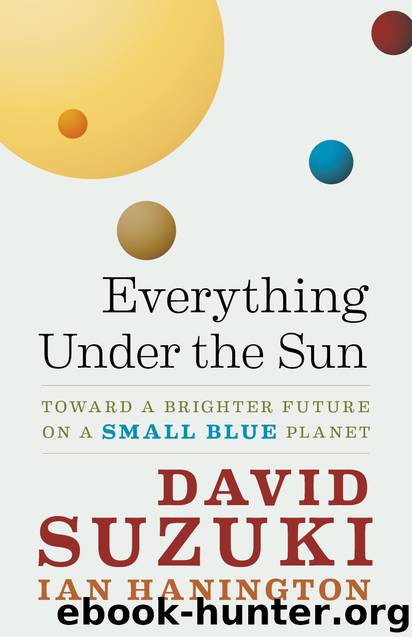Everything Under the Sun by Hanington Ian Suzuki David & Ian Hanington

Author:Hanington, Ian, Suzuki, David & Ian Hanington
Language: eng
Format: epub
Tags: NAT011000, SCI026000
Publisher: Greystone Books
Published: 2012-05-28T16:00:00+00:00
Technological fixes can have serious consequences
IN 1962, RACHEL CARSON galvanized a global environmental movement with her book Silent Spring. Before she wrote about the unexpected consequences of pesticides—including bioaccumulation of toxic molecules up the food chain—scientific innovations such as DDT dazzled us with their promise of greater control over the forces impinging on our lives.
We often look to technological fixes without acknowledging our ignorance about how the world works, and then we end up trying to correct the unexpected problems that result. When we began to use CFCs in large amounts, scientists had no idea they might affect the ozone layer. Salmon farms seemed like a good idea, but no one anticipated parasitic sea-lice outbreaks that would harm wild salmon.
Scientists find clever ways to tease out information about our world. And everywhere we look, we discover new challenges because our knowledge is so primitive. Accumulating pollutants in air, water, soil, and our bodies; vanishing species; loss of nutrients in topsoil; ocean degradation—all of these provide warnings that human numbers, consumption, and activity are undermining the very things that keep us alive.
Climatologists have accumulated a powerful set of observations and models pointing to fossil-fuel use as the cause of global warming. Obviously, the solution is to reduce the amount of greenhouse gases we create so that the biosphere can sop up the rest. Some imaginative suggestions would allow us to continue to burn fossil fuels without reduction: giant umbrellas in space to shield the earth from the sun, aerosols of sulphide to mimic volcanic emissions that reflect sunlight, and so on. Two that have attracted attention are iron seeding in oceans and carbon capture and sequestration on land.
The first involves putting iron into the oceans to fertilize waters where the lack of iron limits algae growth. In the lab, it has been shown that adding this iron to Antarctic Ocean water, for example, leads to massive increases in the algal populations. Companies have been formed on the promise that putting iron into oceans to induce algal blooms will help absorb carbon dioxide from the atmosphere. But in a 2010 paper in the prestigious journal Proceedings of the National Academy of Sciences, scientists reported that this process can cause the blooming of plants that produce deadly neurotoxins. Oops.
The second suggestion is carbon capture and sequestration. Canadian prime minister Stephen Harper has avoided discussion of the serious impacts of climate change on Canada and the economic implications of failing to reduce emissions. Instead, government policy is based on the fear that reducing emissions will be economically destructive, so we will wait instead for the development of methods to pump carbon dioxide into the ground. This technique is based on an observation that when carbon dioxide is pumped into depleted wells so that more oil can be recovered, the CO2 doesn’t come back out. This has led to a hope that we can capture much of the CO2 from smokestacks, coal plants, and the tar sands and simply inject it into the ground—out of sight, out of mind.
Download
This site does not store any files on its server. We only index and link to content provided by other sites. Please contact the content providers to delete copyright contents if any and email us, we'll remove relevant links or contents immediately.
International Integration of the Brazilian Economy by Elias C. Grivoyannis(109991)
The Radium Girls by Kate Moore(12018)
Turbulence by E. J. Noyes(8040)
Nudge - Improving Decisions about Health, Wealth, and Happiness by Thaler Sunstein(7691)
The Black Swan by Nassim Nicholas Taleb(7106)
Rich Dad Poor Dad by Robert T. Kiyosaki(6607)
Pioneering Portfolio Management by David F. Swensen(6288)
Man-made Catastrophes and Risk Information Concealment by Dmitry Chernov & Didier Sornette(6005)
Zero to One by Peter Thiel(5786)
Secrecy World by Jake Bernstein(4741)
Millionaire: The Philanderer, Gambler, and Duelist Who Invented Modern Finance by Janet Gleeson(4465)
The Age of Surveillance Capitalism by Shoshana Zuboff(4275)
Skin in the Game by Nassim Nicholas Taleb(4237)
The Money Culture by Michael Lewis(4198)
Bullshit Jobs by David Graeber(4179)
Skin in the Game: Hidden Asymmetries in Daily Life by Nassim Nicholas Taleb(3989)
The Dhandho Investor by Mohnish Pabrai(3758)
The Wisdom of Finance by Mihir Desai(3732)
Blockchain Basics by Daniel Drescher(3574)
